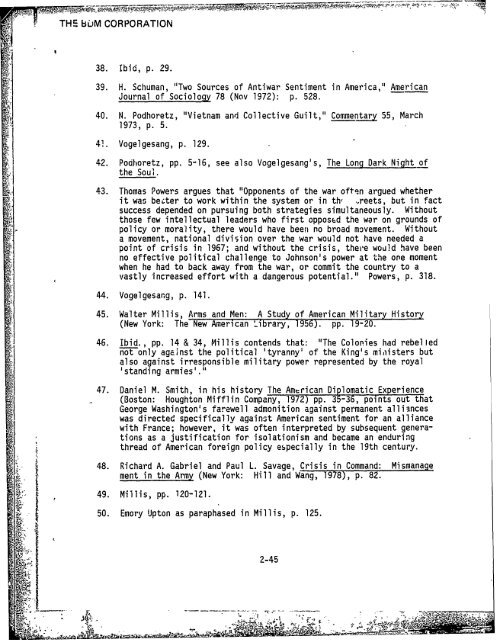policy - The Black Vault
policy - The Black Vault
policy - The Black Vault
You also want an ePaper? Increase the reach of your titles
YUMPU automatically turns print PDFs into web optimized ePapers that Google loves.
THE BuM CORPORATION<br />
38. Ibid, p. 29.<br />
39. H. Schuman, "Two Sources of Antiwar Sentiment in America," American<br />
Journal of Sociology 78 (Nov 1972): p. 528.<br />
40. N. Podhoretz, "Vietnam and Collective Guilt," Commentary 55, March<br />
1973, p. 5.<br />
41. Vogelgesang, p. 129.<br />
42. Podhoretz, pp. 5-16, see also Vogelgesang's, <strong>The</strong> Long Dark Night of<br />
the Soul.<br />
43. Thomas Powers argues that "Opponents of the war often argued whether<br />
it was becter to work within the system or in the ..reets, but in fact<br />
success depended on pursuing both strategies simultaneously. Without<br />
those few intellectual leaders who first opposed the war on grounds of<br />
<strong>policy</strong> or morality, there would have been no broad movement. Without<br />
a movement, national division over the war would not have needed a<br />
point of crisis in 1967; and without the crisis, there would have been<br />
no effective political challenge to Johnson's power at the one moment<br />
when he had to back away from the war, or commit the country to a<br />
vastly increased effort with a dangerous potential." Powers, p. 318.<br />
44. Vogelgesang, p. 141.<br />
45. Walter Millis, Arms and Men: A Study of American Military History<br />
(New York: <strong>The</strong> New American 'Library, 1956). pp. 19-20.<br />
46. Ibid., pp. 14 & 34, Millis contends that: "<strong>The</strong> Colonies had rebelled<br />
no-'fonly against the political 'tyranny' of the King's miaisters but<br />
also against irresponsible military power represented by the royal<br />
'standing armies'."<br />
Pt<br />
47. Daniel M. Smith, in his history <strong>The</strong> American Diplomatic Experience<br />
(Boston: Houghton Mifflin Company, 1972) pp. 35-36, points out that<br />
George Washington's farewell admonition against permanent alliances<br />
was directed specifically against American sentiment for an alliance<br />
with France; however, it was often interpreted by subsequent generations<br />
as a justification for isolationism and became an enduring<br />
thread of American foreign <strong>policy</strong> especially in the 19th century.<br />
48. Richard A. Gabriel and Paul L. Savage, Crisis in Command: Mismanage<br />
ment in the Army (New York: Hill and Wang, 1978), p. 82.<br />
49. Millis, pp. 120-121.<br />
50. Emory Upton as paraphased in Millis, p. 125.<br />
tV<br />
11"<br />
2-45<br />
A V . . . . .
















